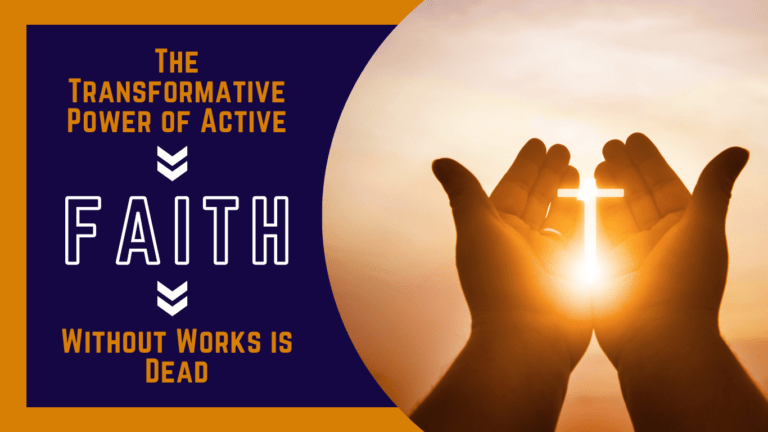One constant remains in a world filled with uncertainties: the unwavering power of active faith. As followers of Christ, our journey with Him is not passive. Instead, it is a dynamic and transformative relationship that calls us to take responsibility for our walk with Him. The Bible is full of teachings on the power of faith, encouraging us to move beyond acknowledging God’s existence by embracing a life marked by intentional and active trust in Him.
Active Faith: To understand the idea of active faith, let’s examine James 2:17 (ESV), where the Apostle James states, “So also faith by itself if it does not have works, is dead.”

Active faith is more than just agreeing with certain beliefs; it is an energetic force that compels us to demonstrate our convictions through tangible actions. It involves a commitment to display our faith in God by doing good deeds and following the guidance provided by His teachings. Dead faith lacks corresponding actions or works; it means someone claiming to have faith but does not demonstrate it through actions in addition to the following:
- Failure to Help Those in Need: Knowing someone in need but not taking practical steps to help James. (2:15-16).
- Mere Lip Service: Professing faith verbally but not living it out in one’s conduct. (Isaiah 29:13)
- Ignoring God’s Commands: Disregarding God’s commands and living contrary to His Word. (Mark 7:8-9)
- Hypocrisy: Pretending to be righteous or spiritual but lacking genuine transformation.James 1:22 (NIV) – “Do not merely listen to the word, and so deceive yourselves. Do what it says.”
- Refusal to Repent: Persisting in sinful behavior without a repentant heart. Acts 26:20 (NIV) – “…I preached that they should repent and turn to God and demonstrate their repentance by their deeds.”
- No Impact on Character: Claiming faith but not experiencing a change in character or lifestyle.

2 Corinthians 5:17 (NIV) says, “Therefore, if anyone is in Christ, the new creation has come: The old has gone, the new is here!”
In essence, dead faith is characterized by an absence of genuine, transformative actions that align with one’s professed belief. The Bible emphasizes the importance of active faith, producing fruit through good works and righteous living.
The Bible is full of inspiring stories of individuals who demonstrated active faith. One example is Abraham, who is considered the father of faith. Abraham obeyed God’s call and journeyed into the unknown (Hebrews 11:8). These stories are powerful testimonies of the results of actively living out one’s faith rather than just professing it (James 2:25).
The Power of Ownership: Taking ownership of our faith is essential to our walk with the Lord. In Philippians 2:12 (NIV), Paul urges believers to “work out your salvation with fear and trembling.” This does not mean we can earn salvation through our works, but it highlights the importance of actively cooperating with God to grow our faith. When we take responsibility for our spiritual journey, we position ourselves to experience the transformative power of God in our lives.
Take Personal Responsibility for your faith journey: Taking ownership means recognizing that our faith is personal, and we are responsible for our choices in living out that faith. It involves acknowledging that no one else can believe or trust in God on our behalf.
Intentional Relationship with God: Owning our faith requires intentional communion with God through prayer, study of Scripture, and seeking His guidance. It’s about actively seeking to know God more deeply and allowing His presence to shape our thoughts, actions, and decisions.
Living Out Biblical Principles: Faith without works is dead (James 2:17). Taking ownership involves aligning our actions with our beliefs. It means applying biblical principles daily, demonstrating love, kindness, and obedience to God’s Word.
Accountability: Owning our faith also means being accountable to God and fellow believers. This involves being open to correction and growth and allowing the faith community to support and challenge us in our walk with Christ.
Purposeful Growth: Taking ownership includes a commitment to spiritual growth. This may involve learning, studying, and actively seeking opportunities for personal and communal growth in faith. It’s a recognition that we are continually being transformed into the image of Christ.
Courageous Trust: Courageous trust involves stepping out in faith even when faced with uncertainties. Like Abraham, who obeyed God’s call without knowing where he was going (Hebrews 11:8), taking ownership requires a courageous trust in God’s guidance and sovereignty.
Authenticity: Owning our faith means being authentic about our struggles, doubts, and victories. It involves acknowledging our imperfections and relying on God’s grace while actively working towards becoming more like Christ.
Taking ownership of our faith is a dynamic and proactive approach to our relationship with God. It’s about living a life that reflects the transformative power of faith, actively participating in sanctification, and allowing our beliefs to shape every aspect of our existence.

Finally, my dear brothers and sisters, let us answer the call to embrace an active faith and take ownership of our walk with the Lord Jesus. The Scriptures urge us to move beyond the shallow waters of passive belief and dive deep into a vibrant, life-changing relationship with our God, the creator of the universe.
As we live out our faith in practical ways, let us be vessels through which the power of God is made evident in our lives and the world around us. Remember the words of Jesus in Matthew 17:20 (ESV), “For truly, I say to you, if you have faith like a grain of mustard seed, you will say to this mountain, ‘Move from here to there,’ and it will move, and nothing will be impossible for you.”
May our faith be active, our walk intentional, and our lives a testimony to the transformative power of the living God with whom we have a relationship.
CEO/Founder Vessel For Honor Ministries.
Web: http://m57.e22.myftpupload.com
https://www.johncmaxwellgroup.com/isabellanyakundi/About
E-Mail: [email protected]
